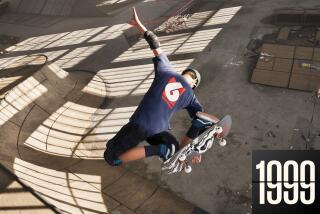World on Wheels rolls to an end
A throbbing hip-hop beat spilled from the speakers, and ceiling lights splashed colorful mosaic dots across the darkened maple planks. Skaters -- four here, six there, maybe eight ahead of them -- grabbed one another’s hands and formed circles.
Like miniature planets orbiting a sun, the groups glided counterclockwise around the oval rink, occasionally caroming off other skaters.
The regulars’ ecstatic smiles masked a pervasive sadness.
World on Wheels, the last full-fledged indoor roller skating rink in the city of Los Angeles, will hold its final lace-up Sunday night. For three decades, the Mid-City institution has won loyalists as an indoor amusement park, party venue, fitness center, haven for young people and hip-hop incubator. It has even played matchmaker.
But a bankruptcy proceeding, a change in ownership and evolving neighborhood tastes have conspired to end its free-wheeling days.
“It’s like losing a member of the family,” said Nelson Bracamonte, 55, a weekly regular at the rink since its opening on Halloween 1981.
For Antwan “Frreshh” McDaniel, 26, the closure constitutes a loss both personal and cosmic. Back when neighborhood teens wore Afros and drove beat-up Beetles, McDaniel attended his sister’s 13th birthday party at World on Wheels. A toddler, he went around slipping his tiny feet into each guest’s skates.
He has been a regular there ever since. A few days before the rink shut down, he wore red knee-length pants, a white shirt, gold chains, diamond stud earrings and mismatched skates -- one white, one red.
“World on Wheels feels like a dining room, a home, your backyard, a small church,” he said.
The place attracted a United Nations of skaters young and old -- including rocket scientists, retirees and R&B; aficionados.
McDaniel said skating helped him cope with past struggles: parental neglect, his mother’s death, his asthma, the loss of a friend to gang crossfire, and his own injury, a wounded leg at age 5 after somebody shot into his living room.
He spent as many as 30 hours a week at World on Wheels, shimmying with other adults or performing his showy “crazy legs” and “shoot the duck” at sessions with children and teenagers.
“This place, I believe, is what saved me,” he said.
Diverse vibe
Through the years, World on Wheels drew crowds by bringing in entertainers. LA Dream Team, a pioneering West Coast hip-hop duo, sang there in the 1980s. The Scooby Brothers, a trio who skated in the 1979 film “Roller Boogie” with Linda Blair, performed at World on Wheels’ opening and skated there until the end.
On one of the rink’s final days, most skaters were seasoned practitioners who could glide backward and forward with equal aplomb and speed. From the upper-level observation deck, they looked like a swarm, legs crisscrossing, shoulders bobbing. Two women sank into the splits. A man leaped up and clicked his skates together in mid-air. Exuberance was in great supply.
The musical vibe at World on Wheels changed from day to day. On Fridays, hundreds of kids from church groups skated to gospel music. On Wednesday nights, skaters grooved to R&B; and hip-hop. Once a month for 12 years running, DJ Riley More queued up tunes by the likes of Debbie Deb and Dazz Band for roller disco night, where older soul skaters and retro young adults alike did the “downtown” step.
“What was cool about our party, we’d school the kids too young to remember what disco was,” More said. “We would get a lot of new blood into that rink. ... They’d get exercise and skate rather than turning gang. That rink helps the entire community.”
Dense and diverse, Mid-City spreads south and west from where Venice, San Vicente and Pico boulevards converge. Amid a vast shopping center parking lot, the basement roller rink shared a building with a bowling alley and a diner outfitted with vinyl-covered booths and speckled linoleum floors.
AMF Bowling Centers, the operations’ owner, filed last year for bankruptcy-court protection under Chapter 11.
Last month an investment group including Young Management Co. bought the property, next to Midtown Shopping Center. The company said residents have requested family sit-down restaurants, health clubs or movie theaters to replace the lanes and rink.
Many urban rinks across the country have closed in recent years after owners decided they could no longer afford the rent, taxes and necessary upgrades.
Roller skating dates to the late 1700s, according to James Vannurden, director and curator of the National Museum of Roller Skating in Lincoln, Neb. The first mass-produced roller skate was patented in Paris in 1819. It was an in-line skate with a wooden sole, leather straps and three wheels made of wood, metal or ivory. The skates were not very maneuverable, making it difficult to do anything but move in a straight line and make sweeping turns.
In 1863, Massachusetts-born James Leonard Plimpton patented a four-wheeled roller skate capable of turning and immediately revolutionized the sport. Three years later, he opened the first public roller skating rink at a resort hotel in Newport, R.I.
--
Closing time
One night last week as World on Wheels skaters zipped around Bracamonte -- their wheels making a cicada-like chorus -- Bracamonte twirled at center rink. With his ponytail flying, he raised his arms over his head then lowered his hands to cover his eyes. He popped out of his spin and began to move rhythmically to the beat. He bumped his hips from side to side, scooting forward the toe of one skate, then the other.
Bracamonte, who years ago moved to live closer to World on Wheels, was relishing the same thrill of the roll he has felt thousands of times in the more than three decades since he first donned skates at Venice Beach.
“When I go to the rink,” he said, “I forget about my bills. I forget about my problems. It’s like a sanctuary.”
From now on, he and his comrades will be traveling farther -- to Cerritos, Glendale, Northridge, Chino -- to experience that Zen. Those rinks have good points, but World on Wheels was home.
Mathew Owens, 69, a retired defense and space systems contractor, discovered World on Wheels in 2002 after his divorce. His skates resurfaced when he moved to L.A. from Thousand Oaks. He felt self-conscious at the rink until someone his age walked in. He later met his current wife there.
He is part of a group seeking to find a new operator for the rink. They have floated Magic Johnson’s name, hoping the former basketball player turned entertainment executive might roll to the rink’s rescue.
--



